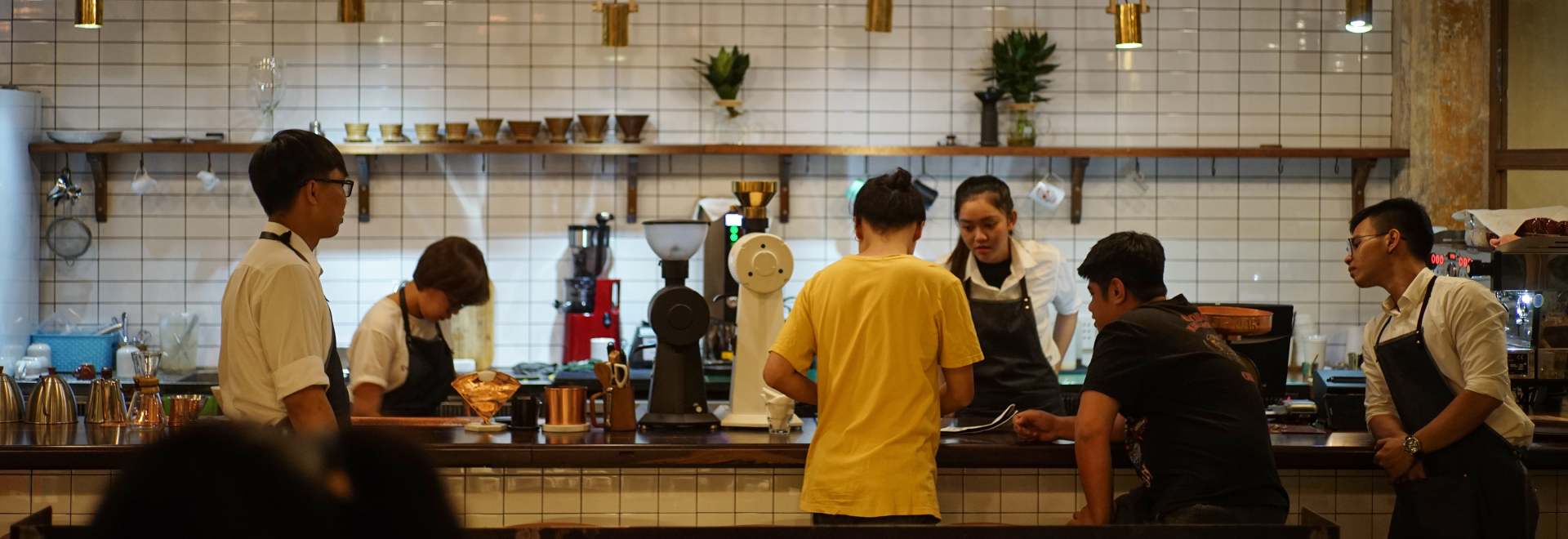Charting the journey from barista to café owner
The transition from “barista” to “cafe owner” seems like a natural progression Jenna Gottlieb speaks with Emily McIntyre about the valuable experience of working in a coffee shop, as well as what being a barista doesn’t teach you.
The dream of owning a coffee shop is one many baristas share, but the road to becoming a café owner is not easy.
The role of “barista” is often seen as temporary. A lack of agency over their own hours and little scope for negotiating wages leaves many in the industry wanting more. Plus, the limited number of available managerial jobs creates a lack of upward mobility.
As such, the role of a barista is rarely a long-term career, as there is little job security offered. Saving for the future, buying a house, and supporting a family is often unattainable, especially as living costs rise.
The idea of becoming a café owner is attractive for baristas who want more control over operational decisions and for those striving for higher earning potential.
The step from barista to café owner might seem like a natural one. Baristas already have a foundational knowledge of café operations, the technical ability to brew coffee, and the lived experience of catering to a varied customer base. What’s more, they may also have a good understanding of the best sourcing practices for coffee.
If this is a dream you have, then it’s wise to learn as much as possible while working as a barista. For example, finding out who the local suppliers are and what the process is for orders and deliveries. On top of that, understanding how to cost products so that the café is earning a decent profit margin on each of its products.
The employee experience is also important – baristas should consider their own, as well as that of their coworkers.
Of course, there is more to managing a team than understanding the aches and pains of your employees, but being able to have empathy over shared experiences will help build a positive work environment. In turn, this will help minimise employee turnover – one of the biggest challenges facing coffee shops.
The experience gained by working as a barista can certainly serve a future café owner well. However, the benefits of owning a café do not come easy and it will take more than a rudimentary understanding of how a coffee shop operates to run a successful business.

Factors to consider before becoming a café owner
There is no set route to becoming a café owner, but the position of a barista is a good place to start.
Emily McIntyre is the founder & CEO of Catalyst Trade. She says baristas should leverage their position as industry insiders.
“Ensure you understand café operations inside and out, in every possible way,” she says. “This should include sourcing ingredients and menu development, hiring and managing employees, inventory and financial management, and more.”
One of the first crucial considerations is location. “Make sure you have a location which is as inexpensive as possible and will allow for a solid customer base,” says Emily. “Parking usually matters a lot.”
Footfall is crucial. A cafés location dictates the kind of customers that will walk through your doors. And while the margins are good, at the price point for coffee a high volume of sales is needed to achieve any kind of profit.
The next step is funding and setup costs. Letting a commercial space can be very expensive. Developing a shoestring operation – such as starting with a coffee cart – is a great way to grow with less risk attached.
Starting a café is an expensive venture, and unexpected costs will often emerge along the way. Emily cautions that you will need more capital than you think. “Whatever you think you need, I’d recommend doubling it,” she says.
According to Investopedia, costs for starting a sit-down coffee shop can be anywhere from $80,000 to $275,000. Some of the up-front big-ticket items include espresso machines, which could cost up to $23,000, and if you’re roasting your own coffee, industrial roasters can cost more than $15,000.
A management or barista business course can offer tailored training, but nothing compares to the real thing. “Whether through trial and error or through education, the key thing is to learn quickly so that your inevitable mistakes don’t cost you too much,” says Emily. “Learning on the job is a good thing.”

Advice and warnings
The fundamental difference between a barista and a café owner is accountability – and not just for the business, but also its employees.
“Just be aware that running a cafe is a lot of work and very different from managing it for someone else,” says Emily. “At the end of the day, everything is on your shoulders.”
Pay close attention to the business, not just the brand. A new café owner not only needs to get their shop to a profitable position, but wider tasks such as VAT returns, end-of-year accounts, ensuring the appropriate licences are held, and managing payroll and employer contributions also falls on their shoulders.
And hard work does not always guarantee success. According to a 2019 survey, around 62% of independent coffee shops fail within the first five years of opening, while 17% close within the first 12 months. “Most business success is a combo of luck and hard work, while failure is luck and hard work too,” Emily says.
Given the high level of risk, signing personal guarantees for debt to kickstart a coffee shop may be inadvisable unless you understand and accept the potential consequences.
“Build in as much buffer as you can in every area so that even if things do go badly, you will not be harmed much,” says Emily. “And make small experiments for new things, putting limited amounts of resources into it until you have data proving it’ll work.”
Indeed, data is a café owner’s friend. Solid point-of-sale and inventory software make tracking sales, losses and costs more manageable, from which informed business decisions can be made.
Ultimately, experience as a barista can stand someone in good stead. However, becoming a café owner takes much more than the ability to brew a good cup of coffee. Anyone starting out on this journey must be aware not just of the increased workload, but also of the heavier burden of running a business.








